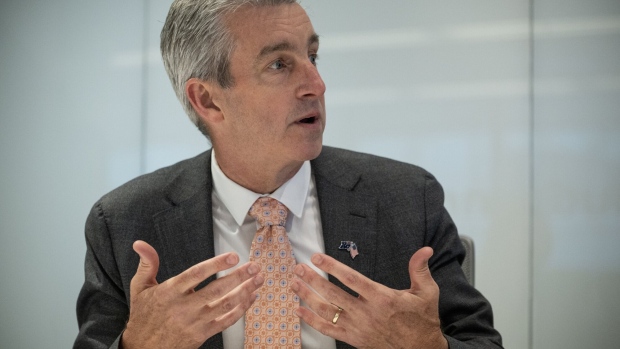Jan 18, 2024
Australia’s Top Pension Says Buy Private Equity in Tough Times
, Bloomberg News

(Bloomberg) -- The chief investor for Australia’s biggest pension fund said the best time to deploy private capital is precisely when funds are struggling to raise money.
The good vintages for private equity funds happen after “tough times,” AustralianSuper Chief Investment Officer Mark Delaney told Bloomberg in an interview in New York Thursday, the same week the fund opened a new office in Manhattan at an event attended by New York’s mayor and the pension’s partners, including TPG Inc., Churchill Capital and New Mountain Capital.
Buyout shops in the US have struggled recently amid a deal drought and a dearth of capital as interest rates remain relatively elevated and banks tighten lending restrictions. But AustralianSuper is ramping up its push. It relocated its global head of private equity to New York and, in a counter-cyclical move, plans to double its existing team of nine private equity experts as part of a broader plan to access private markets.
“This is primarily about private markets, about making sure we’ve got access to the right people and the right assets in the right way,” AustralianSuper Chief Executive Officer Paul Schroder told Bloomberg, as he wore a lapel pin with US and Australian flags. “If you can’t be good at finance in New York, you can’t be good at finance.”
AustralianSuper has invested $6.5 billion in private equity so far and deliberately works with only 10 managers in the US — typically offering check sizes of approximately $500 million.
First Call
With more on-the-ground presence in New York, “our ambition is to be the first call and the fastest answer,” Schroder said. “Because the managers only have a certain number of calls and a certain number of days to take their actions.”
Read More: A $185 Billion Australian Fund Ramps Up New York, London Hiring
Australia’s A$3.6 trillion ($2.4 trillion) pension industry, known as superannuation, is increasingly looking overseas as it outgrows smaller domestic capital markets. Unlike US pension funds, which are on average underfunded, Australian funds come with flush cash flows and fewer distribution demands.
Fund assets are projected to surge to more than A$9 trillion in the next two decades, fueled by compulsory employer contributions of 11% of worker salaries that will grow to 12% within three years.
AustralianSuper doesn’t plan to make direct investments itself, choosing not to be seen as a direct competitor to the investment managers that it relies on for fund investing. Instead, it’s seeking to allocate more capital to invest in and underwrite deals alongside its general partners, Schroder said.
When it comes to private credit, Delaney expressed skepticism.
“There’s no doubt that private credit’s attractive. The spreads are substantial, with double-digit returns,” he said. “But you’re getting double-digit returns because interest rates are higher and you are assuming there’s going to be very low defaults. And both those things may not be sustainable in the long run.”
While the fund still invests in private credit, it’s more focused on private equity.
“We’re open for business,” Schroder said. “We’ve got the ability to write big checks.”
--With assistance from Amy Bainbridge, Dawn Lim and Allison McNeely.
©2024 Bloomberg L.P.






